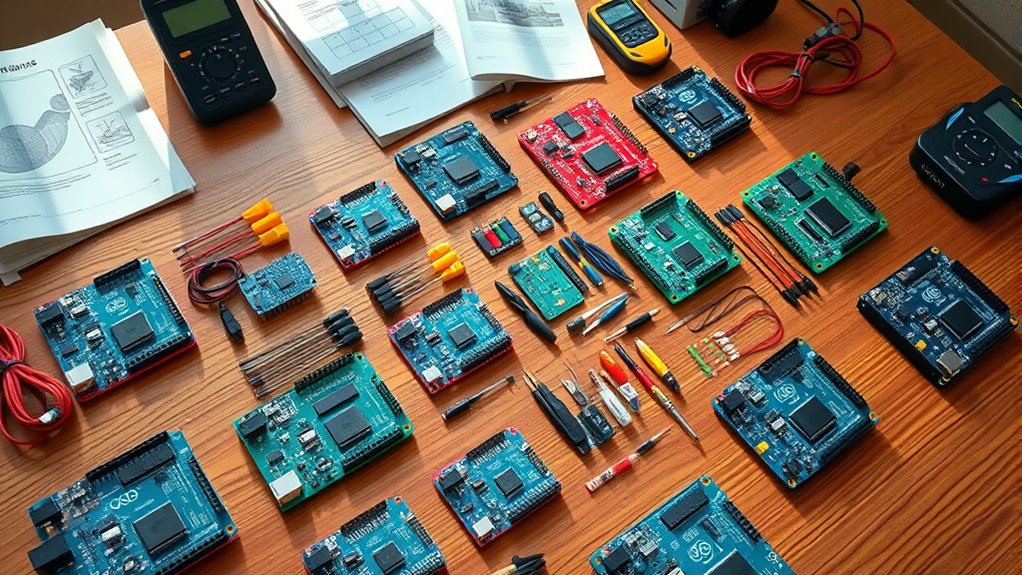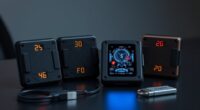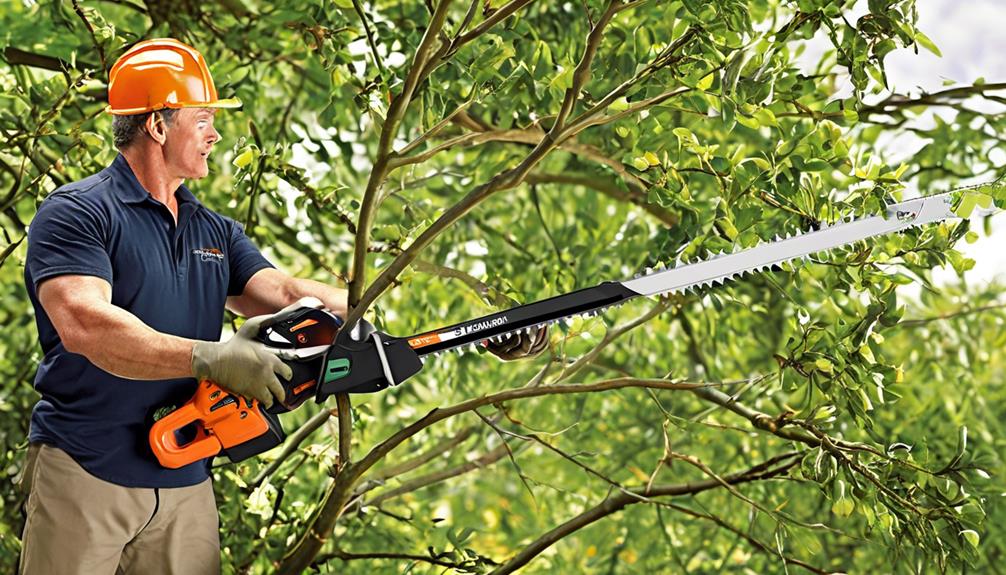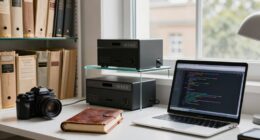If you’re looking to jumpstart your electronics projects in 2025, I recommend exploring some of the top Arduino starter kits available. From all-inclusive options like ELEGOO and SunFounder to the official Arduino kit, these packages include a wide variety of components, detailed tutorials, and compatibility with Arduino IDE, making learning easier. Whether you’re a beginner or educator, there’s a kit perfect for you. Keep scrolling to discover how each one can power up your DIY journey.
Key Takeaways
- Choose kits with a wide variety of components like sensors, motors, and LCDs for versatile project options.
- Prioritize beginner-friendly kits with detailed tutorials, clear instructions, and organized storage solutions.
- Ensure compatibility with Arduino IDE and support for multiple Arduino boards (UNO R3, Mega, Nano).
- Consider kits offering comprehensive learning materials, including project books and online resources.
- Evaluate user reviews and pros/cons to find reliable, high-quality kits suitable for different skill levels in 2025.
ELEGOO UNO Project Starter Kit with UNO R3 Board
Are you new to electronics and looking for an easy-to-use starter kit? The ELEGOO UNO Project Starter Kit with UNO R3 Board is perfect for beginners. It includes over 22 lessons, detailed PDF tutorials, and organized components like LCDs, sensors, LEDs, motors, and RFID modules. The kit’s UNO R3 board is compatible with Arduino UNO R3, R4, MEGA 2560 R3, and NANO, ensuring versatility. All parts are high-quality, clearly labeled, and easy to assemble without soldering. Whether you’re just starting or exploring DIY projects, this kit offers a reliable, all-encompassing introduction to electronics and programming at an affordable price.
Best For: beginner electronics enthusiasts and students seeking an easy-to-use, comprehensive starter kit for learning Arduino-based projects.
Pros:
- Includes over 22 lessons with detailed PDFs and tutorials, ideal for beginners
- Compatible with multiple Arduino boards like UNO R3, R4, MEGA 2560 R3, and NANO for versatile projects
- High-quality, well-labeled components that are easy to assemble without soldering
Cons:
- Some users report missing small parts or defective components upon arrival
- Basic programming instructions may be insufficient for advanced users or more complex projects
- Updates to software and tutorials are frequent, requiring users to seek the latest online resources
Official Arduino Starter Kit with 12 DIY Projects
The Official Arduino Starter Kit with 12 DIY Projects is an ideal choice for beginners and educators seeking a thorough, hands-on introduction to electronics and programming. It includes genuine Arduino parts sourced from Italy, ensuring quality and compatibility, along with a well-organized packaging that enhances the unboxing experience. The kit features components like LEDs, sensors, transistors, and a wooden base, supporting 12 projects guided by a detailed 170-page book. Perfect for all skill levels, it offers clear instructions and increasing complexity, making learning engaging and accessible. Overall, it’s a reliable, educational kit that encourages experimentation and foundational understanding of electronics.
Best For: beginners, educators, and hobbyists looking for a comprehensive and educational introduction to electronics and programming with high-quality Arduino components.
Pros:
- Includes genuine Arduino parts sourced from Italy, ensuring durability and compatibility
- Comes with a detailed 170-page project book suitable for all skill levels
- Well-organized packaging and high-quality components provide an enjoyable unboxing and building experience
Cons:
- Some users mention minor issues like torn packaging or missing small accessories
- No downloadable manuals or digital content included, which could enhance convenience
- The kit is primarily aimed at beginners and may require additional components for advanced projects
ELEGOO UNO R3 Starter Kit with 200+ Components
If you’re just starting out in electronics and want an all-inclusive, budget-friendly kit, the ELEGOO UNO R3 Starter Kit is an excellent choice. It includes over 200 components, such as 63 types of Arduino-compatible modules, all neatly stored in a compartmentalized case. The kit features a proven UNO R3 controller, soldered modules for easy wiring, and detailed tutorials with 30+ lessons. Rated 4.7 stars by thousands of users, it offers great value, quality components, and reliable performance. Perfect for beginners and students, it’s a comprehensive toolkit that encourages hands-on learning and project experimentation in electronics and programming.
Best For: beginners, students, and hobbyists seeking a comprehensive and budget-friendly Arduino starter kit for learning electronics and programming.
Pros:
- Includes over 200 components and 30+ detailed tutorials for hands-on learning
- High-quality ELEGOO UNO R3 board with reliable performance compatible with Arduino IDE
- Organized in a compartmentalized case, making storage and transport convenient
Cons:
- Some components, like resistors, are low-grade and can be difficult to handle or identify
- Short USB cable and small parts may require replacements or extensions for ease of use
- Certain modules, such as MOSFET transistors and rotary encoders, may have issues or need replacements
SunFounder Elite Explorer Kit with Arduino Uno R4 WiFi, IoT Bluetooth, LCD1602 OLED, Starter Kit
For beginners and learners aged 8 and up, the SunFounder Elite Explorer Kit offers an excellent starting point with its genuine Arduino Uno R4 WiFi board, which includes built-in WiFi and Bluetooth for IoT projects. The kit features over 300 high-quality components, such as sensors, LEDs, motors, and displays, compatible with Arduino Uno R3 and Nano. It provides extensive tutorials, including 60+ free videos and step-by-step guides, covering more than 50 projects in electronics, coding, and IoT. Users appreciate its value, quality parts, and all-encompassing educational support, making it perfect for hobbyists, students, and educators enthusiastic to explore IoT and robotics.
Best For: beginners, students, educators, and hobbyists aged 8+ interested in learning electronics, coding, and IoT projects with a comprehensive and easy-to-use starter kit.
Pros:
- Includes a genuine Arduino Uno R4 WiFi with built-in WiFi and Bluetooth for IoT applications
- Over 300 high-quality components and detailed tutorials for a wide range of projects
- Suitable for all skill levels, from beginners to educators, with extensive educational support
Cons:
- Lacks a storage case for organizing components
- Some jumper wires are fragile and may require careful handling
- The kit’s size and weight may be less portable for on-the-go projects
ELEGOO Mega R3 Arduino Starter Kit
Ideal for beginners and hobbyists, the ELEGOO Mega R3 Arduino Starter Kit offers an extensive selection of over 200 high-quality components, making it perfect for those just starting out in electronics and programming. It includes sensors, motors, LEDs, buttons, and more, all organized in a plastic case with a dedicated storage box. The kit features a Mega 2560 board compatible with Arduino IDE, an LCD1602 display, and a GY-521 sensor module with pre-installed pin headers—no soldering needed. With clear tutorials, sample codes, and reliable hardware, it’s a thorough, budget-friendly way to learn circuit design, coding, and project development.
Best For: beginners, hobbyists, and students seeking an affordable, comprehensive starter kit for learning electronics and microcontroller programming.
Pros:
- Includes over 200 high-quality components for versatile project development
- Organized in a durable plastic case with dedicated storage for easy access and organization
- Provides clear tutorials, sample codes, and user-friendly instructions to facilitate learning
Cons:
- Some jumper wires and components may be slightly flimsy or less durable
- Limited customer support, with occasional delays or unresponsiveness from the manufacturer
- Basic software and library support may present minor issues for troubleshooting or advanced projects
Arduino Official Starter Kit Deluxe Bundle with Make: Getting Started Book
The Arduino Official Starter Kit Deluxe Bundle with Make: Getting Started Book stands out as the perfect choice for beginners and educators eager to explore electronics and coding. It offers a comprehensive set of components, including an Arduino Uno, sensors, motors, LEDs, and a display, enabling a wide range of projects from automation to IoT. Fully compatible with the Arduino IDE, the kit guarantees smooth programming experiences for all skill levels. Plus, the included “Getting Started” book provides clear, step-by-step guidance to foster hands-on learning and creativity. It’s an ideal gift for anyone looking to plunge into STEM, DIY projects, or personal tech growth.
Best For: beginners, educators, and hobbyists seeking a comprehensive and user-friendly introduction to electronics, coding, and robotics projects.
Pros:
- Includes a wide variety of components suitable for diverse projects and learning activities
- Fully compatible with the Arduino IDE, ensuring ease of programming for all skill levels
- Comes with a detailed “Getting Started” book to guide users through experiments and build confidence
Cons:
- Might be overwhelming for complete novices due to the volume of components included
- Some advanced users may find the kit’s scope limited for highly complex projects
- The comprehensive package can be relatively costly compared to simpler starter kits
Arduino UNO R3 Starter Kit with Tutorial and Controller Board
If you’re just starting out with Arduino projects, the Arduino UNO R3 Starter Kit with Tutorial and Controller Board provides everything you need to learn and experiment. It features a high-quality UNO R3 compatible board with onboard USB-to-Serial interface, making setup simple. The kit includes a wide variety of components like LEDs, sensors, motors, and breadboards, all stored neatly in an organized plastic box. It comes with a thorough tutorial, example codes, and datasheets to help you understand hardware and programming. While some tutorials could be more detailed, this kit offers great value for beginners eager to explore electronics and robotics.
Best For: beginners, students, and hobbyists looking for a comprehensive and organized entry point into Arduino-based electronics and robotics projects.
Pros:
- Includes a high-quality Arduino UNO R3 compatible board with onboard USB-to-Serial interface for easy setup
- Wide variety of components such as sensors, motors, LEDs, and breadboards stored in an organized, durable plastic box
- Comes with tutorials, example codes, and datasheets to support learning and experimentation
Cons:
- Some tutorials may lack depth and detailed programming guidance for advanced learning
- Certain components like ultrasound sensors and IR remote controls may malfunction and require replacements
- The included USB cable is short, which might limit ease of use during projects
Miuzei Arduino Starter Kit with Microcontroller and Accessories
For beginners and hobbyists looking to immerse themselves in Arduino projects, the Miuzei Arduino Starter Kit stands out because it offers a thorough set of components that are easy to connect and use. It includes a microcontroller, LCD1602 display, breadboard, power supply, servo, sensors, jumper wires, and LEDs—all pre-soldered and connected via pin headers for quick setup. The kit also provides over 28 detailed tutorials and online resources, making learning accessible and straightforward. With a 9V power supply and organized storage in a high-quality box, it’s ideal for hands-on beginners enthusiastic to explore electronics and programming through practical, DIY projects.
Best For: beginners and hobbyists eager to learn Arduino electronics and programming through comprehensive, easy-to-assemble projects.
Pros:
- Includes a wide variety of pre-soldered components and accessories for quick setup
- Provides over 28 detailed tutorials and online resources for guided learning
- Comes with organized storage in a high-quality box, ensuring safety and convenience
Cons:
- May be overwhelming for absolute beginners without basic electronics knowledge
- Limited to Arduino-compatible projects; not suitable for other microcontroller platforms
- Some components, like sensors and servos, may have a learning curve for complete novices
LAFVIN Basic Starter Kit with R3 CH340 and Breadboard
Beginners enthusiastic to plunge into electronics and programming will find the LAFVIN Basic Starter Kit with R3 CH340 and Breadboard an excellent choice. It offers a well-rounded package with a compatible R3 controller, breadboard, and a variety of sensors and components perfect for learning and experimenting. The kit’s parts are designed for seamless integration with the Arduino IDE, making programming straightforward. Although some users report minor issues like sensor quality or connectivity, overall, the kit provides good value and versatility for beginners. With its exhaustive parts list and easy-to-use design, it’s a solid starting point for any aspiring electronics hobbyist.
Best For: beginners and hobbyists looking for an affordable, comprehensive starter kit to learn electronics and programming with Arduino-compatible components.
Pros:
- Compatible with Arduino IDE for easy programming and project development
- Includes a wide variety of sensors and components suitable for multiple projects
- Affordable price point with good value for beginners
Cons:
- Some users report issues with sensor quality or sensor calibration
- Certain boards or modules may experience connectivity or response problems during programming
- Occasional reports of defective components such as rusted connectors or bent pins
Ultimate Starter Kit for Arduino R3 Projects
The Ultimate Starter Kit for Arduino R3 Projects is an excellent choice for those enthusiastic to explore into electronics and programming without feeling overwhelmed. It offers a wide range of components, including a compatible controller board, breadboard, motors, sensors, LEDs, and relays, all designed for easy assembly. The kit comes with detailed tutorials and supports both visual and text-based coding, making it accessible for beginners and versatile for advanced users. Its compact size and extensive content make it ideal for learning, experimenting, and expanding Arduino projects. Overall, it’s a cost-effective, user-friendly starter that encourages creativity and hands-on exploration.
Best For: Beginners, educators, and hobbyists seeking a comprehensive, easy-to-use Arduino starter kit for learning electronics and programming.
Pros:
- Offers a wide variety of components and detailed tutorials suitable for all skill levels.
- Supports both visual programming (Scratch, mBlock) and traditional coding (C), enhancing versatility.
- Compact, affordable, and designed for easy assembly, making it ideal for educational and DIY projects.
Cons:
- Limited resistor variety which may require additional purchase for certain projects.
- Occasional component defects, such as RGB LEDs, can affect project outcomes.
- The case durability and some quality aspects may be minor concerns for long-term use.
LAFVIN Arduino Starter Kit (R3 Mega2560 Mega328 Nano)
The LAFVIN Arduino Starter Kit (R3 Mega2560, Mega328, Nano) stands out as an excellent choice for those looking to immerse themselves in electronics and programming without hassle. It’s perfect for beginners, offering a thorough set of components like motors, LCD modules, and other essential parts. The kit includes a detailed tutorial manual with over 20 lessons, code examples, libraries, and datasheets, making learning straightforward. Fully compatible with the Arduino IDE, it ensures easy programming and project integration. The LCD 1602 module comes with solderless pin headers, simplifying setup and making it accessible for newcomers. This kit truly provides everything needed to jumpstart your projects.
Best For: beginners and hobbyists seeking an all-in-one, easy-to-use electronics starter kit compatible with Arduino IDE for learning and developing projects.
Pros:
- Includes a comprehensive set of components such as motors and LCD modules for diverse project options
- Comes with detailed tutorials, code examples, and datasheets to facilitate learning
- Solderless LCD 1602 module with pin headers simplifies setup for newcomers
Cons:
- May be limited for advanced users requiring specialized or higher-performance components
- The tutorial content might not cover complex or advanced project topics
- Some components, like motors, may require additional accessories for full functionality
SunFounder Starter Kit for Arduino UNO (192 Items, 87 Projects)
If you’re looking for a thorough starter kit that balances ease of use with advanced project potential, the SunFounder Starter Kit for Arduino UNO is an excellent choice. It includes 192 items and supports 87 projects, from basic electronics to IoT and robotics. Compatible with Arduino UNO IDE and Scratch, it features high-quality sensors, actuators, and power supplies, making it suitable for beginners aged 8+ and beyond. The kit offers detailed online tutorials, videos, and expert-designed courses. Many users find it easy to assemble and highly versatile, perfect for learning, experimenting, and creating innovative projects like self-driving cars and sensor automation.
Best For: beginners and students aged 8+ interested in electronics, robotics, IoT, and hands-on project-based learning with a comprehensive starter kit.
Pros:
- Includes 192 high-quality components and supports 87 diverse projects for extensive experimentation
- Compatible with Arduino UNO IDE and Scratch, making it accessible for beginners and versatile for advanced users
- Offers detailed online tutorials, videos, and expert-designed courses to facilitate step-by-step learning
Cons:
- Initial setup may be challenging for complete novices, especially with software and sensor calibration
- Some users report sensitivity issues with certain sensors like the IR module
- Requires familiarity with Arduino IDE and careful attention to instructions to avoid confusion during assembly
GAR Monster Arduino Starter Kit with Sensor Modules and WiFi Bluetooth for STEM Projects
For educators, hobbyists, and beginners eager to explore STEM projects, the GAR Monster Arduino Starter Kit offers an all-in-one solution with over 65 pieces, including five main boards like Arduino Uno R3, Mega 2560, Nano V3, ESP32 WiFi+Bluetooth, and ESP8266 NodeMCU. It features sensors, modules, and accessories such as RFID readers, ultrasonic sensors, RTC, accelerometers, LCDs, relays, servos, and motors. Compatible with Arduino, ESP32, and ESP8266, it requires no soldering. Organized in a durable toolbox with detailed guides and tutorials, it’s perfect for fostering hands-on learning and project development from beginner to advanced levels.
Best For: educators, hobbyists, and beginners seeking a comprehensive and versatile STEM electronics kit for learning and project development.
Pros:
- Includes over 65 pieces with multiple main boards (Arduino, ESP32, ESP8266) for diverse project options
- Comes with extensive documentation, tutorials, and high-quality components from reputable brands
- Organized in a durable toolbox with anti-static storage, making setup and transport easy
Cons:
- Slightly higher price point compared to basic starter kits
- Some modules may require soldering, which can be challenging for beginners
- Occasional missing or bent parts reported, though customer support is responsive
ELEGOO UNO Starter Kit with Tutorial and Arduino R3 Compatibility
Designed specifically for beginners, the ELEGOO UNO Starter Kit offers a thorough introduction to Arduino projects with its included tutorial and compatibility with the Arduino R3 platform. It comes with the latest UNO R3 board, essential components like resistors, LEDs, buttons, and a breadboard, all organized in a clear box with a helpful CD of tutorials. The kit’s instructions cover basic concepts such as resistor color codes and breadboard use, making it ideal for newcomers. While the breadboard is small and the USB cable short, the components are reliable, and the setup works seamlessly with the Arduino IDE, encouraging hands-on learning and experimentation.
Best For: beginners and students seeking an affordable, comprehensive starter kit to learn Arduino and basic electronics concepts.
Pros:
- Includes all essential components and a detailed tutorial, making it easy for beginners to start.
- Compatible with Arduino UNO R3 and other Arduino platforms, ensuring versatile use.
- High-quality Arduino UNO R3 board recognized instantly by the Arduino IDE, ensuring smooth programming.
Cons:
- The small size of the breadboard may limit complex project setups.
- The USB cable is relatively short, which could restrict workspace flexibility.
- The provided tutorials are basic and may require supplementary resources for advanced projects.
Basic Arduino Starter Kit with Breadboard, Power Supply, Jumper Wires, Resistors, LED, Compatible with Arduino R3, Arduino Mega2560, Raspberry Pi
The Basic Arduino Starter Kit with Breadboard, Power Supply, Jumper Wires, Resistors, and LEDs is the perfect choice for beginners and hobbyists eager to explore electronics. It includes essential components like a breadboard, power supply, LEDs, resistors, buttons, and transistors, all stored neatly in a sturdy box. The kit provides jumper wires and DuPont connectors for easy wiring, compatible with Arduino R3, Mega2560, and Raspberry Pi. Detailed tutorials and datasheets are included to guide you through your projects. This complete kit delivers everything you need to start building and experimenting confidently.
Best For: beginners and hobbyists eager to learn electronics and build projects using Arduino, Raspberry Pi, or similar platforms.
Pros:
- Includes all essential components like breadboard, LEDs, resistors, and jumper wires for comprehensive project setup
- Compatible with multiple platforms including Arduino R3, Mega2560, and Raspberry Pi for versatile use
- Comes with detailed tutorials and datasheets to support learning and troubleshooting
Cons:
- Does not include controller boards, requiring users to purchase compatible microcontrollers separately
- Might be overwhelming for absolute beginners due to the variety of components included
- Limited advanced components for more complex or professional-level projects
Factors to Consider When Choosing Arduino Starter Kits

When choosing an Arduino starter kit, I focus on the quality of the components to guarantee durability and reliable performance. Compatibility with my devices and the variety of projects included also matter, as they expand my learning options. Additionally, I consider the learning resources provided and how easy the kit is to assemble to make my beginner experience smoother.
Kit Components Quality
Choosing an Arduino starter kit with high-quality components is vital for reliable performance and long-term durability. Well-made parts ensure consistent operation, reducing the risk of malfunctions like faulty sensor readings or connection issues. Using certified and reputable components also increases safety, as materials such as corrosion-resistant metals and flame-retardant plastics help protect both the user and the device. Clear labeling, detailed datasheets, and precise specifications make troubleshooting easier, especially for beginners. The overall build quality impacts how easily you can solder, wire, and handle the components, which is essential during assembly and experimentation. Investing in high-quality parts not only improves your project’s reliability but also saves time and frustration, making your learning experience smoother and more enjoyable.
Compatibility With Devices
Selecting an Arduino starter kit that’s compatible with your devices guarantees smooth integration and successful project development. First, ensure the kit matches your main development platform, like Arduino UNO, Mega, Nano, or R3, to avoid connectivity problems. Check if it includes or supports essential communication interfaces such as USB, UART, I2C, or SPI, which are indispensable for connecting sensors, modules, and peripherals. Compatibility with your operating system—Windows, macOS, or Linux—is essential for installing drivers and software without issues. Additionally, verify that the components and modules are designed for use with popular microcontrollers and single-board computers to maximize versatility. Finally, choose a kit that explicitly states compatibility with third-party peripherals, so you’re prepared for future expansions and customizations.
Project Variety Offered
Ever wondered how versatile an Arduino starter kit can be? The key lies in its project variety. A good kit should include components like sensors, actuators, displays, and communication modules, allowing for a wide range of projects. The number of tutorials and sample projects gives insight into the scope of experiments you can try, from simple setups to complex applications. Kits with diverse sensors—temperature, humidity, motion—and output devices like LEDs, motors, and screens support exhaustive learning. Compatibility with various programming environments and expansion options further boost project possibilities. A well-rounded kit offers components for beginners, intermediates, and advanced users, enabling continuous growth and exploration across different areas of electronics. This variety keeps your projects fresh and your skills sharp.
Included Learning Resources
Have you considered how the quality of learning resources in an Arduino starter kit can influence your overall experience? Well-designed manuals, PDFs, tutorials, and online videos are essential for building your confidence and understanding. Clear, organized instructions help you complete projects successfully while grasping core concepts like programming and hardware setup. Kits that include step-by-step guides, sample code, and circuit diagrams make troubleshooting easier and learning more efficient. Access to additional resources like community forums, online courses, and downloadable files can further support your growth. Also, multilingual instructions and detailed explanations ensure the kit is accessible to a diverse range of learners. Ultimately, quality learning resources turn a simple kit into a comprehensive educational tool that accelerates your journey into electronics.
Ease of Assembly
When choosing an Arduino starter kit, ease of assembly is a crucial factor that can considerably impact your learning experience. Kits with pre-soldered components and solderless breadboards make setup simpler, letting you focus on projects instead of complicated soldering. Clear, labeled packaging and organized compartments help you quickly identify parts, reducing mistakes and frustration. Step-by-step tutorials and detailed instructions guide beginners through assembly, making the process more straightforward. Components that connect via standard pin headers or plug-and-play modules are especially user-friendly, allowing easy insertion and removal without tools. Additionally, shorter or high-quality cables with well-designed connectors facilitate smoother setup, saving time and effort. All these aspects combined make the assembly process more accessible and enjoyable for beginners.
Price and Value
Choosing an Arduino starter kit involves more than just ease of assembly; it also requires weighing the cost against the value it offers. Prices vary widely, from budget options around $20 to exhaustive sets over $200. While cheaper kits cover basic projects, they often lack advanced sensors and accessories, limiting growth. Higher-priced kits tend to include more components, tutorials, and project possibilities, providing better long-term learning value. It’s important to contemplate the quality of parts and educational resources, not just the initial cost. Investing a bit more in a better-quality kit can save you money and frustration later, as it offers greater expandability and reliability. Ultimately, choosing a kit that balances cost with quality and potential is key to a satisfying learning experience.
Support and Documentation
Ever wonder how helpful a starter kit’s support and documentation really are? For beginners, extensive support and detailed documentation make all the difference. Well-organized tutorials, including step-by-step guides and sample codes, help you grasp hardware connections and programming concepts with ease. Access to online resources like videos, forums, and FAQs provides quick solutions to common problems and deepens your understanding. Clear datasheets and wiring diagrams ensure you assemble projects accurately, reducing mistakes. Responsive customer support and regular software updates also enhance your experience by offering ongoing help and ensuring compatibility with new tools. Overall, reliable support and thorough documentation empower you to learn faster and troubleshoot confidently, making your Arduino journey smoother and more enjoyable.
Frequently Asked Questions
Which Arduino Starter Kit Is Best for Beginners With No Prior Electronics Experience?
If you’re new to electronics, I recommend starting with an Arduino starter kit that’s beginner-friendly and easy to navigate. I’d suggest the official Arduino Starter Kit because it comes with clear instructions, a variety of components, and project ideas that build your confidence. It’s perfect for someone with no prior experience, helping you learn the basics while having fun creating simple, rewarding projects.
Are Compatible Components Included in These Kits Sufficient for Advanced Projects?
You’re curious if the included components suit more complex projects. While these kits are great for beginners, they often lay a solid foundation rather than cover every advanced need. I’ve found that they’re perfect for learning basics, but for more intricate projects, you might want to add specialized parts later. Think of the kit as a good starting point—expanding your toolkit over time to uncover more advanced possibilities.
How Do I Choose Between Arduino Uno, Mega, or Other Microcontrollers in Kits?
When choosing between Arduino Uno, Mega, or other microcontrollers, I consider my project’s complexity and number of I/O pins needed. The Uno’s great for simple tasks, while the Mega handles bigger projects with more sensors and outputs. I also look at compatibility, community support, and size. Picking the right one depends on your project scope, but I recommend starting with Uno for beginners and expanding from there.
Do These Starter Kits Support Wireless Connectivity Like Wifi or Bluetooth?
Did you know that over 60% of beginner projects now incorporate wireless features? Most starter kits do support WiFi or Bluetooth, but it varies. I recommend checking if the kit includes modules like the ESP8266 or HC-05. This way, you can easily add wireless connectivity to your projects without extra purchases. I always look for kits with built-in wireless modules to save time and simplify initial setup.
What Additional Tools or Accessories Might I Need Beyond the Starter Kits?
When considering what additional tools or accessories I might need beyond a starter kit, I think about my project goals. Usually, I find myself needing extra sensors, jumper wires, or a multimeter for troubleshooting. Sometimes, I require a soldering iron for more permanent connections or specific shields for wireless modules. Planning ahead helps me make certain I have everything to bring my ideas to life without interruptions.
Conclusion
So, as I’ve discovered, choosing the right Arduino starter kit really depends on what sparks your curiosity. Whether it’s the all-inclusive ELEGOO UNO R3 or the versatile SunFounder Explorer, I’ve found that the perfect kit often comes when you least expect it—like stumbling upon that hidden gem in a crowded shelf. Whatever you pick, just remember, the right kit can turn a simple idea into your next great project. Happy tinkering!










